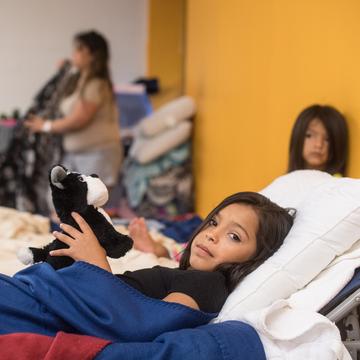
A 9 year-old girl is of 16 extended family members who evacuated together to the shelter for hurricane Harvey. All the children have been attending the »ÆÉ«ÊÓƵchild-friendly space set up in the shelter.
Children's Emergency Fund
Nobody knows when the next crisis will strike, but your support helps »ÆÉ«ÊÓƵprovide assistance in the critical first hours and days of an emergency when children need us most. When generous people like you make your 100% tax-deductible gift, children's lives are saved and their futures are brighter.
10 Tips for Helping Children Cope with Disaster
After a disaster, parents, teachers and caregivers look for advice on how to help children manage stress. These 10 tips from Save the Children’s emergency response experts can ensure that children get the support they need – well after the disaster is over.
- Limit TV time.
While it’s important for adults to stay informed about the disaster, TV images and reports may be a source of stress. Watching too many reports of the disaster can overwhelm children. - Listen to your children.
See what they know – or understand – about the disaster before responding to their questions. Children can experience stress when they don’t understand dangerous experiences. Try to identify your children’s fear of disasters. Then, talk to them to help ease their concerns. - Give children reassurance.
Let them know that family and friends are doing everything they can to protect them. Be sure they know that if an emergency occurs, their safety is your main concern. Children should know they’re being protected. - Be alert for significant changes in behavior.
Caregivers should be alert to any significant changes in children’s sleeping patterns, eating habits, and concentration levels. Also watch for wide emotional swings or frequent physical complaints. If any of these actions do happen, they will likely lessen within a short time. If they continue, however, you should seek professional help and counseling for the child. - Understand children’s unique needs.
Not every child will experience a disaster in the same way. As children develop, their intellectual, physical and emotional abilities change. Younger children will depend largely on their parents to interpret events. Older children and adolescents will get information from various sources, such as friends and the media. Remember that children of any age can be affected by a disaster. Provide them all with love, understanding and support. - Give your children extra time and attention.
Children need attention to know they are safe. Talk, play and, most importantly, listen to them. Find time to engage in special activities with children of all ages. - Be a model for your children.
Your children will learn how to deal with these events by seeing how you respond. The amount you tell children about how you’re feeling should depend on the age and maturity of the child. You may be able to disclose more to older or more mature children but remember to do so calmly. - Watch your own behavior.
Make a point of being sensitive to those impacted by the disaster. This is an opportunity to teach your children that we all need to help each other. - Help your children return to a normal routine.
Children usually benefit from routine activities such as a balanced diet, bedtime, and playing with others. Find out you’re your children’s school is will return to normal hours. Ask teachers or counselors how much time will be dedicated to discussing the disaster in an age-appropriate way. - Involve children in volunteer work.
Helping others can give children a sense of control and security and promote helping behavior. Include children in volunteer activities (once it is safe to do so). Helping people who are in need can bring about a positive outlook.
